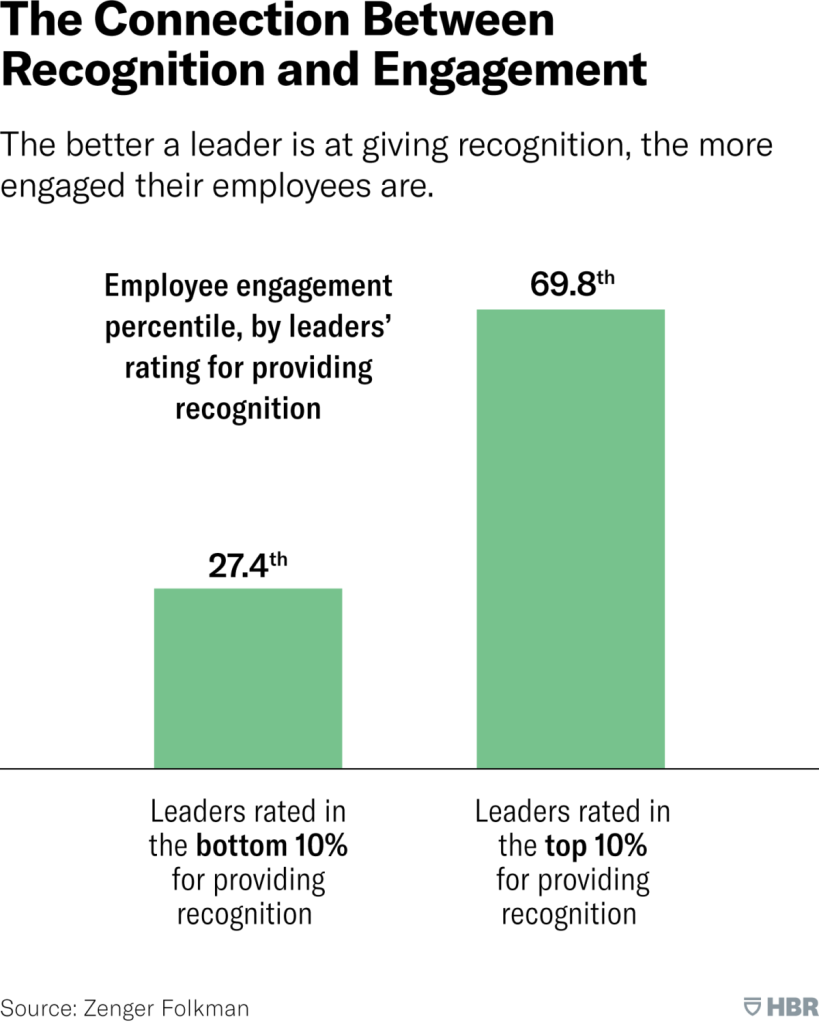Story by Gemma Beasley / September 12, 2022

Recognizing employees for the good work they do is a critical leadership skill – and has an impact on morale, productivity, performance, retention, and even customer satisfaction. Yet, there are a frightening number of leaders who fail to do it frequently or skillfully. Based on an analysis of thousands of 360-degree leadership assessments, the authors show there is a strong connection between employee recognition and engagement. Managers who are rated in the top 10% for giving recognition are much more likely to have employees who report feeling engaged, confident they’ll be treated fairly, and willing to put in higher levels of discretionary effort.
The research is clear: Employee recognition — when done well — has huge payoffs. According to the data we collect on leaders across industries, every measure of morale, productivity, performance, customer satisfaction, and employee retention soars when managers regularly provide recognition.
And, yet, there are many leaders out there who fail to do it frequently or skillfully. In fact, the most common complaint that we hear about managers is that they fail to convey appreciation. One survey, conducted at a health care company, found that 29% of employees reported not having received any recognition within the past year.
The graph below is an analysis of a subsection of the tens of thousands of 360-degree assessments we’ve collected. The data shows the impact of giving recognition on levels of employee engagement. Leaders rated in the bottom 10% for providing recognition had employees at the 27th percentile on engagement. By contrast, those leaders rated in the top 10% were at the 69th percentile.

Those leaders in the top group also had employees who:
When we asked a global sample of over 12,000 people their preference for giving and receiving recognition, 33% indicated they dislike receiving recognition. We contend that this is most often a semantic problem. Had we asked, “Do you like to be appreciated for your accomplishments?” we suspect nearly all respondents would have said “Yes.” Almost everyone appreciates “appreciation,” which implies a more quiet, personal expression, without fanfare and hoopla.
For many people, “recognition” means being called out in a meeting and given public praise for something they’ve accomplished. It conjures up images of spotlights glaring on them, and they might find all that attention embarrassing. Whether because of their personality or perhaps cultural upbringing, being publicly singled out is uncomfortable for a substantial number of people. In other words, it’s the way that the recognition is delivered that they resist, not the underlying message of appreciation.
We conducted a different analysis of 658 leaders using the data we had on on their preferences for giving and receiving recognition. Of those, 513 managers had a strong desire to give recognition while 145 resisted giving it. We compared that data to the 360-degree feedback ratings we had for those leaders from their manager, peers, direct reports, and others, and those who were more inclined to give recognition were also perceived as being better at:
Getting better at giving recognition requires focusing on both the substance of the recognition itself and the manner and context in which you deliver it.
Can a leader give too much recognition? We know it may be possible, but we have not seen it happen. It is often helpful at the end of each day to ask yourself: “Who went above or beyond today? Who did more than was expected? Who made a helpful contribution?” Then, when names will come to mind — don’t hesitate to give the recognition in a way that is most meaningful to them.
We all have heard about the importance of recognition and yet many leaders are not doing it enough. While the data from our research isn’t necessarily groundbreaking, we hope it’s an important reminder to tell people — those who report to you but your peers, and yes, even your boss — what they need to hear, not just what you want to say.
Read the full article by Jack Zenger in HBR here
Construction recruitment agencies are common. Strong partnerships rooted in trust and good communication are rare. Learn why we’re the latter.
Learn MorePut your career in the hands of recruiters who know your worth. We focus on your long term success and strive to make your job search process feel effortless.
Learn MoreThe construction industry's grapevine is buzzing with talk of a job market on the upswing. It's got firms scrambling, and for good reason. Just the...
If you've been tracking the pulse of the construction industry lately, you've likely noticed that wage discussions are all the rage. The workforce, from fresh-faced...
If you've been on a construction site lately, you may have noticed the fresh-faced workers sporting toolbelts don't come cheap. Clients are sounding the alarm...
Even for high-profile, big-budget construction projects, recruiting qualified labor has become an immense challenge. Time and again, firms are met with rejection from experienced professionals...
Every construction leader is tasked with finding and attracting talent to support your company's growth. The trouble is, you’re supposed to do this while juggling...
Landing a second interview is huge, but don't think you're home free. The industry is ultra-competitive, especially when hiring at senior level. Don’t rely on...
A client recently shared a story that made me rethink some long-held beliefs around employee turnover. They told me about a superintendent named Mike, who...
PWC is a national nonprofit organization that seeks to support, advance, and connect women and promote diversity within the architecture, engineering, construction, (AEC) and related...
When Mike's daughter was born, he was anxious about balancing his construction foreman job with fatherhood. His company offered only 1 week of paid leave,...
As contractors sound alarms over skilled labor shortages, they repeatedly overlook a hidden asset – working moms. While women make up only 10% of the...
Fatigue from years of physical labor sets in. Noisy chaos frays your nerves. You’ve maxed out your pay scale. You’re struggling to see opportunities for...
Buildings account for nearly 40% of global emissions, putting immense pressure on construction firms to prioritize sustainable and net-zero practices. Cities like New York and...
Bonuses work. When done right. While variable pay plans have tremendous potential to accelerate results and incentivize top talent, without proper structuring and communication, they...
As a recruiter in the trenches, I’ve seen the construction industry’s hiring crisis up close. Project managers are slammed, desperately piecing together teams at the...
You've made it to the final round of interviews with your chosen construction firms. After months of rigorous screening, you've proven yourself again and again....
The COVID-19 pandemic brought construction sites grinding to a halt. Teams accustomed to hands-on collaboration were forced into remote work overnight. Many adapted well during...
When clouds roll in, it’s tempting to hunker down and pray for sun. But storms can also offer firms a chance to fortify foundations and...
Any construction company's reputation hinges on the caliber of its craftsmanship. This applies not only to client projects, but also to the employer brand you...
The threat of being replaced can fill even the most seasoned leaders with dread and self-doubt. As new talent arrives, it's only natural to feel...
Every time we talk to a candidate about your company, and the position you need to fill, we have to be able to articulate why...
Recruiting is a transitory process that can feel uncertain – even when the conditions that surround it are perfect. But as staffing specialists within the...
Project lists are an essential part of applying for new jobs in construction. They can make the difference between securing an interview or not and...
Robotics in construction are on the rise, and new market research shows that the sector is expected to swell in value as contractors look to...
IntroductionU.S. construction companies are entering a transformative era where artificial intelligence (AI) and automation will increasingly augment how projects are planned, built, and managed. A...